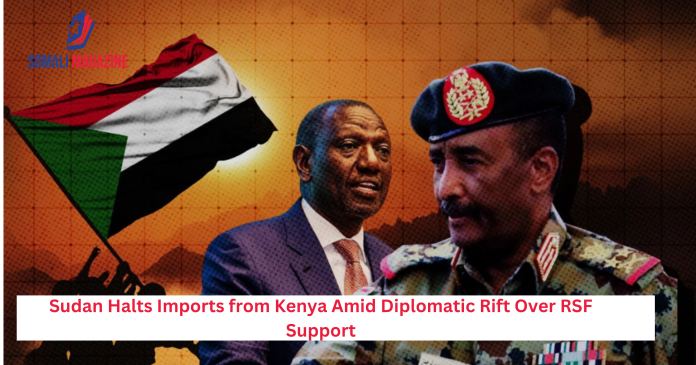Facebook Twitter (X) Instagram Somali Magazine - People's Magazine
Sudan’s Ministry of Trade and Supply has announced an indefinite suspension of all imports from Kenya in response to the country’s recent decision to host the paramilitary Rapid Support Forces (RSF) in Nairobi. This move follows a resolution by the Sudanese Cabinet aimed at penalizing Kenya for supporting RSF activities, which have exacerbated tensions within Sudan.
The Sudanese government justified the decision as a measure to safeguard national security and uphold the country’s sovereignty. According to the official statement, the suspension of Kenyan imports aligns with Cabinet Resolution No. 129 of 2024 and follows recommendations from a Sovereignty Council committee tasked with addressing Kenya’s engagement with the RSF. The statement emphasized Sudan’s commitment to protecting its supreme interests and ensuring its security.
“Based on Cabinet Resolution No. (129) of 2024, and in accordance with the competencies stipulated in Cabinet Resolution No. (104) of 2021, and based on the recommendation of the committee formed by the Sovereignty Council to deal with the State of Kenya for hosting the Rapid Support Militia and its allies and sponsoring their activities and meetings, and to preserve Sudan’s supreme interests, affirm its sovereignty and protect its national security,” the statement declared.
“The following decision was issued: Suspension of all the imports of all products coming from the State of Kenya is suspended through all ports, crossings, airports and outlets, effective from this date until further notice. All concerned parties shall implement the decision.”
The decision comes in the midst of an ongoing conflict in Sudan between the Sudanese government and the RSF, which erupted in April 2023. The war has caused significant destruction and loss of life, with both factions vying for control over different parts of the country. Currently, the Sudanese army holds sway over the eastern and northern regions, while the RSF maintains dominance in the western and southern areas.
Kenya’s decision to host RSF leaders, who recently signed a founding charter to establish a parallel government in Sudan, has led to heightened regional tensions. Historically, Kenya has played a mediating role in regional conflicts, but its recent actions have raised concerns about its foreign policy stance and its potential implications for stability in Sudan.
In its initial response, Sudan’s Ministry of Foreign Affairs condemned Kenya’s move, stating that it violated Sudan’s sovereignty and amounted to interference in its internal affairs. The Ministry accused Kenya of enabling the RSF to carry out propaganda and political activities while the paramilitary group continued to commit crimes against civilians.
“Hosting leaders of the terrorist RSF militia and allowing them to conduct political and propaganda activities while they continue to perpetrate genocide, massacre civilians on an ethnic basis, attack IDP camps, and commit acts of rape constitutes endorsement of and complicity in these heinous crimes,” the Ministry’s statement read.
The African Union also voiced strong opposition to Kenya’s decision, warning that the move could lead to the partition of Sudan. In an official statement, the AU reaffirmed its position against recognizing any parallel government or entity in Sudan.
“The Council does not recognize the purported parallel government or entity in the Republic of Sudan,” the AU stated, emphasizing the risks posed by such developments.
Kenya’s Foreign Affairs Cabinet Secretary, Musalia Mudavadi, defended the decision, asserting that Kenya’s role was to facilitate peace and assist Sudan in resolving its ongoing crisis. According to Mudavadi, Kenya has historically provided a platform for Sudanese factions to engage in peace talks and seek long-term solutions.
“We note that this is not the first time groups in Sudan have sought solutions to their crisis by leveraging the good offices of neighbouring countries. Indeed, in January 2024, parties and stakeholders to the Sudanese conflict met in a neighbouring country to chart a way forward on inclusive dialogue and return to civilian rule,” said Mudavadi.
He further explained that the RSF and Sudanese civilian groups had convened in Nairobi to present a roadmap for resolving the conflict, which was consistent with Kenya’s long-standing role in regional peace efforts.
“Rapid Support Forces (RSF) and Sudanese civilian groups’ tabling of a roadmap and proposed leadership in Nairobi is compatible with Kenya’s role in peace negotiation which enjoins her to provide non-partisan platforms to conflict parties to seek resolutions,” Mudavadi added.
The diplomatic fallout between Sudan and Kenya highlights the complexities of regional geopolitics and the challenges of balancing mediation with sovereignty concerns. While Kenya maintains that its involvement aims to foster peace, Sudan views it as an endorsement of an armed group challenging the state’s authority. The trade suspension signals a significant escalation in diplomatic tensions, with potential economic ramifications for both nations. As the situation unfolds, regional stakeholders and international bodies will be closely monitoring developments to assess their impact on Sudan’s fragile stability and broader East African geopolitics.

